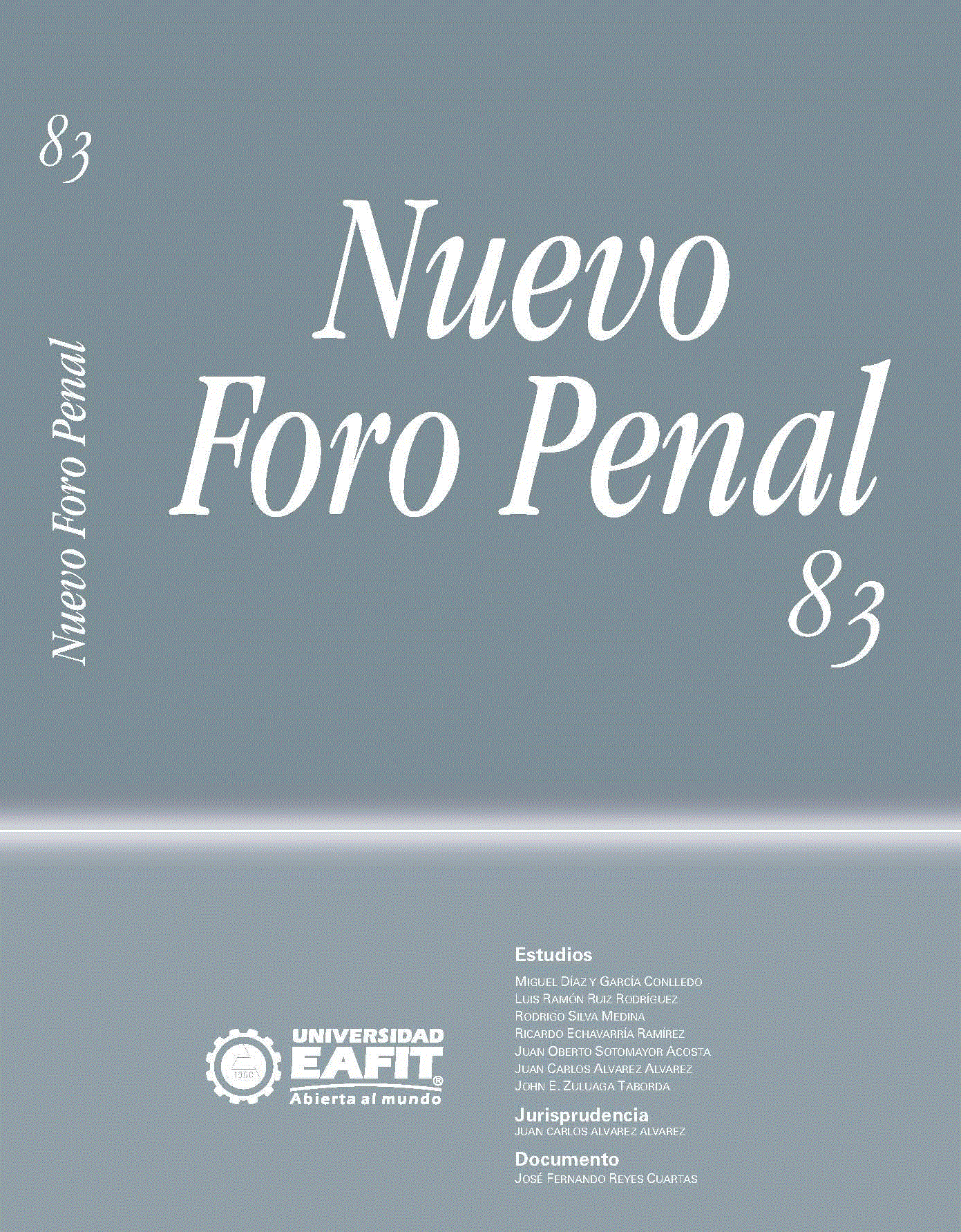Los «sufrimientos» del delito de tortura
Main Article Content
Keywords
Tortura, Derecho penal, sufrimiento, autonomía personal, dignidad.
Resumen
El delito de tortura previsto en el Código penal colombiano inicialmente preveía que los sufrimientos físicos o psíquicos que constituyen la parte objetiva del tipo de tortura debían ser graves. En 2005, la Corte Constitucional declaró inexequible la expresión «graves» de dicha definición. No obstante, pueden surgir dudas sobre el sentido de los sufrimientos propios del delito de tortura. ¿Cualquier sufrimiento es susceptible de ser delito de tortura? ¿Hay alguna diferencia entre el sufrimiento del delito de tortura respecto del sufrimiento de otros delitos? En este artículo se propone una interpretación del tipo objetivo del delito de tortura que cumple con el mandato de determinación de la ley penal, es decir, que intenta diferenciar suficientemente la conducta constitutiva de tortura de otras figuras delictivas, para alcanzar la seguridad jurídica en su aplicación.
Descargas
Referencias
Botterud, Karen F, “International Protection Of Fundamental Freedoms And Human Rights: The Convention Against Torture And Other Cruel, Inhuman or Degrading Treatment or Punishment”, en Asils International Law Journal, N.º 8, 1984.
Burgers, J. Herman/ Danelius, Hans, The United Nations Convention against Torture. A Handbook on the Convention against Torture and Other Cruel, Inhuman or Degrading Treatment or Punisment, Dordrecht, 1988.
Cohan, John Alan, “Torture and the necessity doctrine”, en Valparaiso University Law Review, N.º 41, 2007.
Copelon, Rhonda, “Recognizing the Egregious in the Everyday: Domestic Violence as Torture”, en Columbia Human Rights Law Review, Vol. 25, N.º 2, 1994.
Cullen, Anthony, “Defining Torture in International Law: A Critique of the Concept Employed by the European Court of Human Rights”, en California Western International Law Journal, N.º 34, 2003.
Durán, Carlos Villán, “La convención contra la tortura y su contribución a la definición del Derecho a la integridad física y moral en el Derecho internacional”, en Revista Española de Derecho Internacional, N.º 2, 1985.
Dworkin, Ronald, El dominio de la vida. Una discusión acerca del aborto, la eutanasia y la libertad individual, (trad. Caracciolo/Ferreres), Barcelona, Ariel, 1994.
Elshtain, Jean Bethke, “Reflection on the Problem of ‘Dirty Hands’”, en Levinson, Sanford (ed.), Torture. A Collection, New York, Oxford University Press, 2004.
Felip i Saborit, David, “Las lesiones”, en Silva Sánchez, Jesús-María (dir.)/ Ragués i Vallès, Ramon, Lecciones de Derecho penal. Parte Especial, Barcelona, Atelier, 2006.
Gimbernat Ordeig, Enrique, Concepto y método de la ciencia del Derecho penal, Madrid, Tecnos, 1999.
Harper, Julianne, “Defining Torture: Bridging The Gap Between Rhetoric And Reality”, en Santa Clara Law Review, N.º 49, 2009.
Ignatieff, Michael, “Moral Prohibition at a Price”, en Roth, Kenneth/Worden, Minky, (eds.), Torture. Does It Make Us Safer? Is It Ever OK? A Human Rights Perspective, Nueva York, The New Press/Human Right Watch, 2005.
Kant, Immanuel, La metafísica de las costumbres, 2.ª ed., (trad. Cortina Orts/Conill Sáncho), Madrid, 1994.
Larenz, Karl, Derecho justo. Fundamentos de ética jurídica, (trad. Díez-Picazo Giménez), Madrid, Civitas, 1985.
Lee, Patrick, “Interrogational Torture”, en American Journal of Jurisprudence, Vol. 51, 2006.
Lewis, Michael, “A Dark Descent into Reality: Making the Case for an Objective Definition of Torture”, en Washington and Lee Law Review, N.º 77, 2010.
Luban, David J., “Liberalism, Torture, and The Ticking Bomb”, en Virginia Law Review, Vol. 91, N.º 6, 2005.
Meltzer Henry, Leslie, “The jurisprudence of dignity”, en University of Pennsylvania Law Review, N.º 160, 2011-2012.
Nino, Carlos S., Ética y derechos humanos. Un ensayo de fundamentación, Barcelona, Ariel, 1989.
Parry, John T., “Escalation and Necessity: Defining Torture at Home and Abroad”, en Levinson, Sanford (ed.), Torture. A Collection, Nueva York, Oxford University Press, 2004.
Peces, Gregorio – Martínez, Barba, La dignidad de la persona desde la filosofía del Derecho, 2.ª ed., Madrid, Dykinson, 2002.
Pérez Triviño, José Luís, De la dignidad humana y otras cuestiones jurídico-morales, México D.F., 2007.
Pérez Triviño, José Luís, “La relevancia de la dignidad humana. Un comentario”, en Doxa, N.º 30, 2007.
Peters, Edward, La tortura, (trad. Míguez), Madrid, Alianza Editorial, 1987.
Posner, Richard A., “Torture, Terrorism, and Interrogation”, en Levinson, Sanford (ed.), Torture. A Collection, Nueva York, Oxford University Press, 2004.
Rebollo Vargas, Rafael, “Título VII. De las torturas y otros delitos contra la integridad moral”, en Córdoba Roda, Juan/García Arán, Mercedes [dirs.], Comentarios al Código penal. Parte Especial, t. I, Madrid, Marcial Pons, 2004.
Rosenkrantz, Carlos Fernando, “El valor de la autonomía”, en Rosenkrantz, Carlos Fernando/Nino, Carlos Santiago/Bouzat, Gabriel/Carrió, Alejandro D./Balbín ,Carlos, La autonomía personal, Madrid, 1992.
Sánchez-Ostiz Gutiérrez, Pablo, Fundamentos de política criminal. Un retorno a los principios, Madrid, Marcial Pons, 2012.
Schlink, Bernhard, “The Problem with ‘Torture lite’”, en Cardozo Law Review, Vol. 29, N.º 1, 2007.
David Sussman, “Defining Torture”, en Case Western Reserve Journal of International Law, Vol. 37, 2005-2006.
Shue, Henry, “Torture”, en Levinson, Sanford (ed.), Torture. A Collection, Nueva York, Oxford University Press, 2004.
Sussman, David, “What’s Wrong with Torture?”, en Philosophy & Public Affairs, N.º 33-1, 2005.
Waldron, Jeremy, “Inhuman and Degrading Treatment: The Words Themselves”, en Canadian Journal of Law and Jurisprudence, Vol. 23, N.º 2, 2010.
Waldron, Jeremy, Torture, terror, and trade-offs: Philosophy for the White House, New York, Oxford University Press, 2010.

